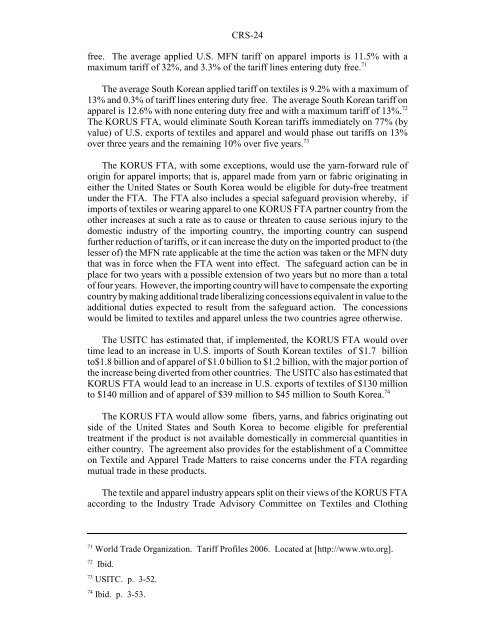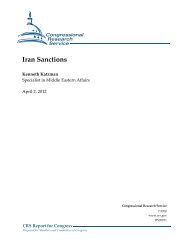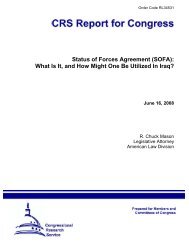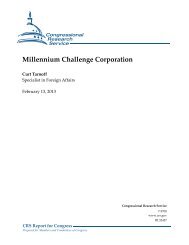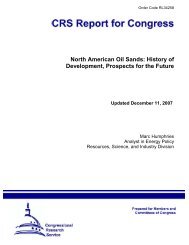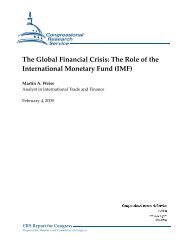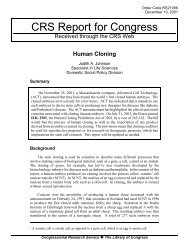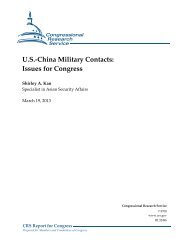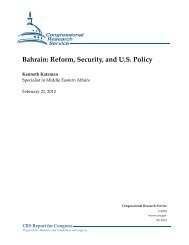The Proposed U.S.-South Korea Free Trade Agreement (KORUS ...
The Proposed U.S.-South Korea Free Trade Agreement (KORUS ...
The Proposed U.S.-South Korea Free Trade Agreement (KORUS ...
- TAGS
- korea
- fpc.state.gov
You also want an ePaper? Increase the reach of your titles
YUMPU automatically turns print PDFs into web optimized ePapers that Google loves.
CRS-24<br />
free. <strong>The</strong> average applied U.S. MFN tariff on apparel imports is 11.5% with a<br />
maximum tariff of 32%, and 3.3% of the tariff lines entering duty free. 71<br />
<strong>The</strong> average <strong>South</strong> <strong>Korea</strong>n applied tariff on textiles is 9.2% with a maximum of<br />
13% and 0.3% of tariff lines entering duty free. <strong>The</strong> average <strong>South</strong> <strong>Korea</strong>n tariff on<br />
apparel is 12.6% with none entering duty free and with a maximum tariff of 13%. 72<br />
<strong>The</strong> <strong>KORUS</strong> FTA, would eliminate <strong>South</strong> <strong>Korea</strong>n tariffs immediately on 77% (by<br />
value) of U.S. exports of textiles and apparel and would phase out tariffs on 13%<br />
over three years and the remaining 10% over five years. 73<br />
<strong>The</strong> <strong>KORUS</strong> FTA, with some exceptions, would use the yarn-forward rule of<br />
origin for apparel imports; that is, apparel made from yarn or fabric originating in<br />
either the United States or <strong>South</strong> <strong>Korea</strong> would be eligible for duty-free treatment<br />
under the FTA. <strong>The</strong> FTA also includes a special safeguard provision whereby, if<br />
imports of textiles or wearing apparel to one <strong>KORUS</strong> FTA partner country from the<br />
other increases at such a rate as to cause or threaten to cause serious injury to the<br />
domestic industry of the importing country, the importing country can suspend<br />
further reduction of tariffs, or it can increase the duty on the imported product to (the<br />
lesser of) the MFN rate applicable at the time the action was taken or the MFN duty<br />
that was in force when the FTA went into effect. <strong>The</strong> safeguard action can be in<br />
place for two years with a possible extension of two years but no more than a total<br />
of four years. However, the importing country will have to compensate the exporting<br />
country by making additional trade liberalizing concessions equivalent in value to the<br />
additional duties expected to result from the safeguard action. <strong>The</strong> concessions<br />
would be limited to textiles and apparel unless the two countries agree otherwise.<br />
<strong>The</strong> USITC has estimated that, if implemented, the <strong>KORUS</strong> FTA would over<br />
time lead to an increase in U.S. imports of <strong>South</strong> <strong>Korea</strong>n textiles of $1.7 billion<br />
to$1.8 billion and of apparel of $1.0 billion to $1.2 billion, with the major portion of<br />
the increase being diverted from other countries. <strong>The</strong> USITC also has estimated that<br />
<strong>KORUS</strong> FTA would lead to an increase in U.S. exports of textiles of $130 million<br />
to $140 million and of apparel of $39 million to $45 million to <strong>South</strong> <strong>Korea</strong>. 74<br />
<strong>The</strong> <strong>KORUS</strong> FTA would allow some fibers, yarns, and fabrics originating out<br />
side of the United States and <strong>South</strong> <strong>Korea</strong> to become eligible for preferential<br />
treatment if the product is not available domestically in commercial quantities in<br />
either country. <strong>The</strong> agreement also provides for the establishment of a Committee<br />
on Textile and Apparel <strong>Trade</strong> Matters to raise concerns under the FTA regarding<br />
mutual trade in these products.<br />
<strong>The</strong> textile and apparel industry appears split on their views of the <strong>KORUS</strong> FTA<br />
according to the Industry <strong>Trade</strong> Advisory Committee on Textiles and Clothing<br />
71 World <strong>Trade</strong> Organization. Tariff Profiles 2006. Located at [http://www.wto.org].<br />
72 Ibid.<br />
73 USITC. p. 3-52.<br />
74 Ibid. p. 3-53.


